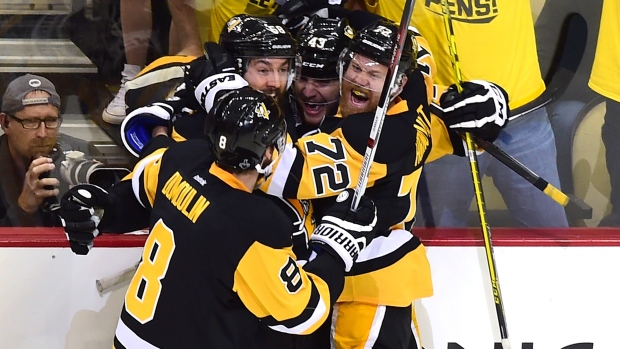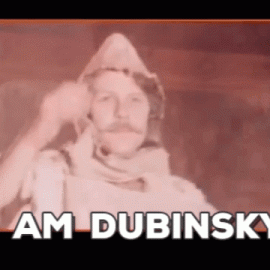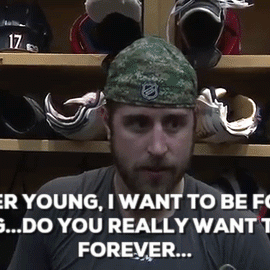Columbus, you were standing at the portal to hockey immortality, like those people staring at the brilliant, white diamond gate in Alphaville’s “Forever Young”. But instead of boldly walking through it, you blinked and fell hard when the door slammed shut in your faces. Thursday night’s emphatic 5-0 loss in Washington ended the Blue Jackets so-called run at the NHL “all-time” winning streak record. In fact, Columbus did set a record Tuesday night when they defeated Edmonton 3-1. The Blue Jackets’ sixteenth straight win established a new (unofficial) record in the shootout era (2005-present), passing the 2013 Penguins of Joe Vitale, Brenden Morrow & Co. who won all 15 games played in March that season.
The “longest winning streak, one season” that the NHL Official Guide & Record Book recognizes still belongs to the 1992-93 Penguins who ran off 17 wins in a row late that season, in the pre-shootout era. Qualifying streaks with “shootout” or “non-shootout” will either prompt you to make a troll face (Penguins fans) or gnash your teeth (Blue Jackets fans). Yet irrespective of team loyalty, the NHL has undeniably changed its regular season end-of-regulation time format significantly at certain points in its 100-year history and thus to compare winning streak records of teams across different eras, is to make the proverbial comparison between apples and oranges.
Put another way, had Columbus won, the NHL would re-write the record book and claim that the Blue Jackets’ “seventeen” is completely identical to the Penguins’ “seventeen”, much like saying these two magazine covers are completely identical.

No and no.
Take nothing away from Columbus. What they accomplished over the past 5 ½ weeks was phenomenal. On the morning their streak started, they were in fourth place in the Metropolitan Division, occupying the Eastern Conference’s first wild card position, with the ninth most points in the league. After winning the next sixteen games, they were in sole possession of top spot in the entire NHL.
However, it is puzzling that the NHL lumps all winning streaks together despite distinct eras when overtime or shootouts simply were not available for teams trying to extend a streak. Many have cited poor goaltending, smaller goaltending equipment and absence of a salary cap as factors that made it easier for teams in the 1980s and early 1990s to put together long winning streaks, factors supposedly as conducive as the presence of shootouts today.
By the same token, CBJ plays in a cap-imposed era of parity, Pens played in a league that was a little more tilted.
— Hockey Abstract (@HockeyAbstract) January 4, 2017
I don’t put much stock into goaltending elements as these would be common amongst all clubs of the same era. There may be some truth to the non-salary cap argument, when wealthy teams retained their key contributors and signed stars away from poorer teams, creating clear talent separation between teams of the same era and a much more polarized league. Yet, few teams in that era, seriously challenged the 17-game winning streak of the Penguins (ironically, a small-market team).
[youtube https://www.youtube.com/watch?v=S8T-HrkrDYo&w=560&h=315]@PenguinsMarch @BlueJacketsNHL @penguins and in pre-salary cap era too, and smaller goalies era, smaller goalie pads era, etc etc etc
— Adam (@adam3vergreen) January 6, 2017
Yet since the penalty shots appendage was grafted onto the end of overtime starting in 2005-06, three teams (2010 Capitals, 2013 Penguins, 2017 Blue Jackets) have won 14 or more in a row with at least one shootout win during their streaks. That is three teams in 12 seasons. Prior to the implementation of the shootout, it took 76 seasons from the NHL’s inception in 1917-18 for three teams (1930 Bruins, 1982 Islanders, 1993 Penguins) to achieve a 14-game winning streak.
[office src=”https://onedrive.live.com/embed?cid=2A728A26A493C6FE&resid=2A728A26A493C6FE%21141&authkey=AN7C2jbTHMZAmj8&em=2&wdAllowInteractivity=False&wdHideGridlines=True&wdHideHeaders=True&wdDownloadButton=True” width=”403″ height=”800″](For best results, click lower-right button to view full-size chart).
The chart above shows that already 15 different franchise record-tying or new franchise record winning streaks have been established in the 12-season shootout era where the streaks included at least one shootout victory. The 30 other franchise record-tying or record-setting streaks compiled without needing any shootout victories, were set over a period of 82 seasons, leading one to conclude that the post-overtime shootout is the most significant factor helping teams in the present era to create and maintain long winning streaks.
[youtube https://www.youtube.com/watch?v=iu0s3qwFPc0&w=560&h=315]Which winning streak is the greatest one in NHL history?
Referring back to the chart, note the “immaculate” winning streaks (white rows) – teams who amassed consecutive stretches of wins without ever going past regulation time. Indeed, six of the clubs on this list set franchise marks before either modern overtime or shootouts were part of the NHL game.
The 1968 Canadiens put together an impressive run of a dozen wins in a row in the pre-OT/pre-shootout era. The 1986 Flyers and 2010 Capitals put together remarkably similar winning streaks in different eras. Philadelphia won 12 straight in regulation before beating New York Islanders in overtime for a thirteenth straight win while Washington started off their streak with a shootout win, won the next 12 in regulation, then beat the Penguins in overtime on Super Bowl Sunday for a fourteenth straight win. Take away the Caps’ shootout win and their feat exactly matched what the Flyers accomplished 24 years earlier.
So now we arrive at the top three. Columbus’ sweet sixteen has already been discussed and has its place in history as the longest in the shootout era. Of the remaining two – the 1982 Islanders and the 1993 Penguins – which is the “Greatest Winning Streak in One Hundred Years of NHL Hockey”TM (GWSi100YoNHLH)?
At the risk of being pushed off a moving cab on the Monongahela Incline, the 1982 New York Islanders streak of 15 straight wins, all in regulation time without the possibility of extending it in overtime or shootout, is the GWSi100YoNHLH.
New York was the two-time defending Stanley Cup Champion and on their way to a second-straight finish atop the NHL standings. Over 31 days, the Isles overwhelmed their opponents 97-35 in goals, beginning with a 6-1 drubbing of the Penguins on January 21, 1982. New York defeated the Pens three more times during the streak before Mike Bullard scored two third period goals, to tie and win the game at Civic Arena on February 21, denying the Islanders their chance at a sixteenth straight win. The only close call for New York was the fifteenth victory when John Tonelli broke a tie with 47 seconds left in regulation.
[youtube https://www.youtube.com/watch?v=dmc3abqzD1Y]Eleven years later, the Penguins were similarly the class of the league. Like the Islanders, they were the two-time defending Stanley Cup Champions; like the Islanders, they were on their way to finishing first in the NHL standings. Pittsburgh doubled their opponents 96-48 in goals over the next seventeen games, all victories. With overtime available, the Penguins took advantage, beating Los Angeles after regulation time in win #2 of the streak and in win #15 against Montreal when, of all people, Ulf Samuelsson scored at 2:11 of OT to bring the Penguins alongside the Islanders in the record book. Two nights later, Mario Lemieux scored five goals in an anticlimactic 10-4 win at Madison Square Garden to set a new all-time NHL winning streak record.
These are the two greatest winning streaks in NHL history, in my mind, without benefit of shootouts. A slight edge to the Islanders’ accomplishment for doing it all in regulation time.
No one has really approached the merits and length of either streak since.
Add The Sports Daily to your Google News Feed!


